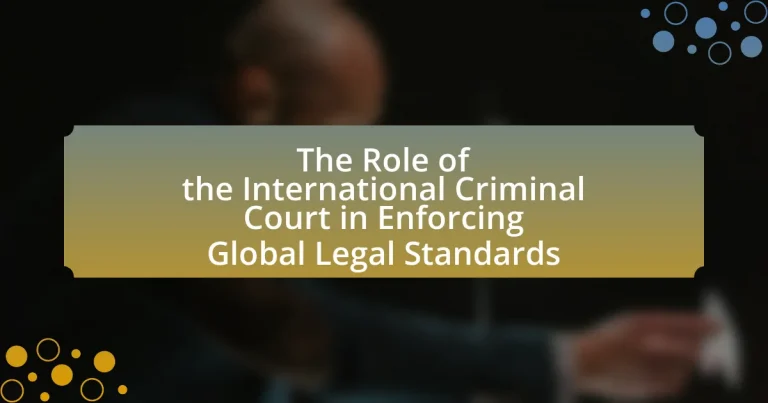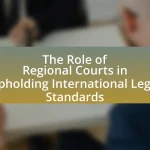The International Criminal Court (ICC) is a permanent international tribunal established to prosecute individuals for serious crimes such as genocide, war crimes, and crimes against humanity, with the aim of promoting justice and accountability. Established by the Rome Statute in 2002, the ICC operates on the principle of complementarity, intervening only when national courts are unwilling or unable to prosecute offenders. The article explores the ICC’s establishment, its key objectives, the types of crimes it addresses, and its operational processes, while also discussing the challenges it faces, including issues of state cooperation and public perception. Additionally, it highlights the significance of the ICC in enforcing global legal standards and the strategies it can implement to enhance its effectiveness and public support.
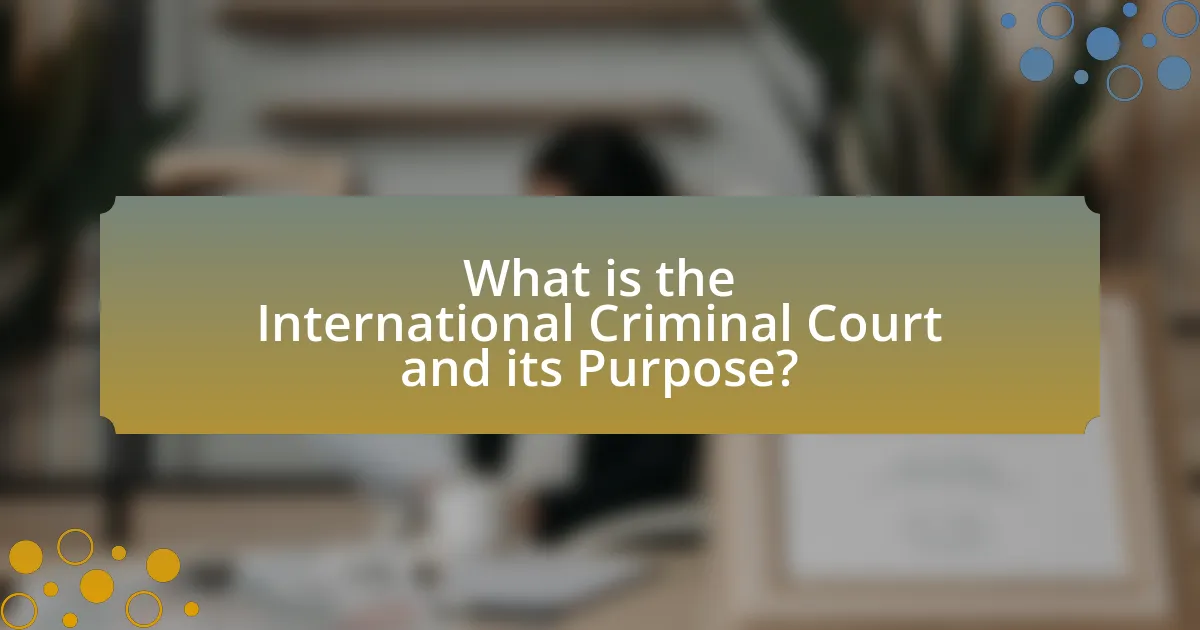
What is the International Criminal Court and its Purpose?
The International Criminal Court (ICC) is a permanent international tribunal established to prosecute individuals for crimes such as genocide, war crimes, and crimes against humanity. Its purpose is to hold accountable those responsible for the most serious offenses that concern the international community, thereby promoting justice and deterring future crimes. The ICC was established by the Rome Statute, which was adopted in 1998 and entered into force in 2002, and it operates based on the principle of complementarity, meaning it acts when national courts are unwilling or unable to prosecute offenders.
How was the International Criminal Court established?
The International Criminal Court (ICC) was established through the adoption of the Rome Statute on July 17, 1998, during a diplomatic conference in Rome, Italy. The Rome Statute came into force on July 1, 2002, after being ratified by 60 countries, thereby creating a permanent international tribunal to prosecute individuals for genocide, war crimes, and crimes against humanity. The establishment of the ICC marked a significant development in international law, as it aimed to hold accountable those responsible for serious violations of human rights and to promote justice on a global scale.
What treaties and agreements led to the formation of the International Criminal Court?
The treaties and agreements that led to the formation of the International Criminal Court (ICC) include the Rome Statute, adopted on July 17, 1998, and entered into force on July 1, 2002. The Rome Statute established the ICC as a permanent institution to prosecute individuals for genocide, war crimes, and crimes against humanity. Additionally, the 1998 United Nations Diplomatic Conference of Plenipotentiaries on the Establishment of an International Criminal Court played a crucial role in the negotiation and adoption of the Rome Statute, reflecting the international community’s commitment to accountability for serious crimes.
What are the key objectives of the International Criminal Court?
The key objectives of the International Criminal Court (ICC) are to prosecute individuals for serious international crimes, including genocide, war crimes, and crimes against humanity. The ICC aims to ensure accountability for perpetrators of these crimes, deter future violations, and promote justice and the rule of law globally. Established by the Rome Statute in 2002, the ICC operates on the principle of complementarity, meaning it intervenes only when national courts are unwilling or unable to prosecute offenders. This framework reinforces the ICC’s role in upholding international legal standards and fostering cooperation among states to combat impunity.
What types of crimes does the International Criminal Court address?
The International Criminal Court addresses four main types of crimes: genocide, war crimes, crimes against humanity, and the crime of aggression. Genocide involves acts committed with intent to destroy a national, ethnic, racial, or religious group. War crimes pertain to serious violations of the laws and customs of war, including the treatment of prisoners of war and the targeting of civilians. Crimes against humanity encompass widespread or systematic attacks against civilian populations, including murder, enslavement, and torture. The crime of aggression refers to the planning, preparation, initiation, or execution of acts of aggression by a state against another state. These definitions are established in the Rome Statute, which serves as the foundational treaty of the International Criminal Court.
What constitutes genocide under the International Criminal Court’s jurisdiction?
Genocide under the International Criminal Court’s jurisdiction is defined as acts committed with intent to destroy, in whole or in part, a national, ethnical, racial, or religious group. These acts include killing members of the group, causing serious bodily or mental harm, deliberately inflicting conditions calculated to bring about its physical destruction, and imposing measures to prevent births within the group. This definition is established in Article 6 of the Rome Statute, which serves as the foundational legal document for the ICC. The ICC prosecutes individuals for genocide to uphold international law and protect vulnerable populations from systematic extermination.
How does the International Criminal Court define war crimes?
The International Criminal Court (ICC) defines war crimes as serious violations of the laws and customs of war that occur during armed conflict. These include acts such as willful killing, torture, taking hostages, and intentionally directing attacks against civilian populations. The definition is grounded in the Rome Statute, which serves as the ICC’s founding treaty, outlining specific conduct that constitutes war crimes and establishing the court’s jurisdiction to prosecute individuals responsible for such acts.
What are crimes against humanity according to the International Criminal Court?
Crimes against humanity, according to the International Criminal Court (ICC), are defined as widespread or systematic attacks directed against any civilian population. These acts include murder, extermination, enslavement, deportation, and other inhumane acts intentionally causing great suffering or serious injury to body or mental or physical health. The ICC’s Rome Statute, which came into force in 2002, outlines these definitions and establishes the legal framework for prosecuting such crimes, emphasizing the need for accountability and justice for victims of egregious violations of human rights.
What is the significance of the International Criminal Court in global legal standards?
The International Criminal Court (ICC) is significant in global legal standards as it establishes a permanent institution to prosecute individuals for serious crimes such as genocide, war crimes, and crimes against humanity. This role enhances accountability and deters future violations by holding perpetrators responsible, thereby reinforcing the rule of law on an international scale. The ICC’s establishment through the Rome Statute in 2002 marked a pivotal moment in international law, as it provided a framework for cooperation among states in prosecuting offenders and promoting justice. The court’s jurisdiction and ability to intervene in cases where national courts are unwilling or unable to act further solidify its importance in upholding global legal standards.
How does the International Criminal Court promote accountability for international crimes?
The International Criminal Court (ICC) promotes accountability for international crimes by investigating and prosecuting individuals accused of genocide, war crimes, and crimes against humanity. The ICC operates under the Rome Statute, which establishes its jurisdiction and procedures, allowing it to hold perpetrators accountable when national courts are unwilling or unable to do so. Since its establishment in 2002, the ICC has conducted numerous investigations and trials, contributing to the establishment of legal precedents and reinforcing the principle that individuals, including state leaders, can be held criminally responsible for serious violations of international law.
What role does the International Criminal Court play in deterring future crimes?
The International Criminal Court (ICC) plays a crucial role in deterring future crimes by holding individuals accountable for serious offenses such as genocide, war crimes, and crimes against humanity. By prosecuting high-profile perpetrators, the ICC sends a clear message that such actions will not go unpunished, thereby discouraging potential offenders. The court’s existence and its legal framework create a deterrent effect, as evidenced by the decline in certain types of violence in regions where the ICC has intervened or threatened to intervene. For instance, the ICC’s involvement in the situation in Uganda led to a significant reduction in violence as leaders recognized the potential for prosecution.
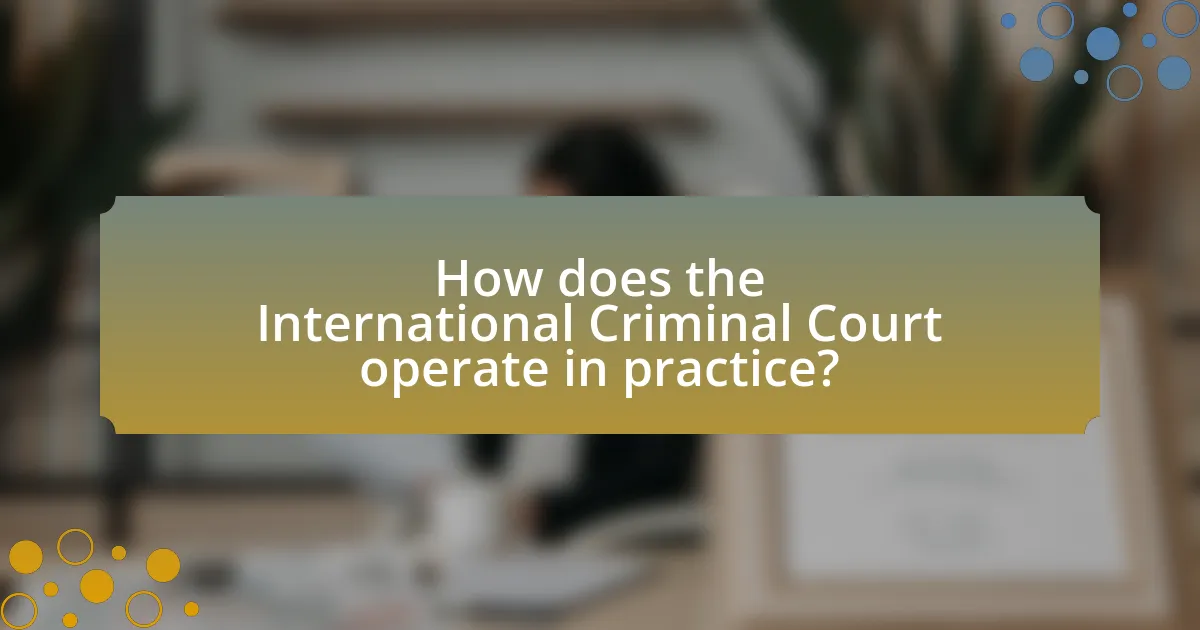
How does the International Criminal Court operate in practice?
The International Criminal Court (ICC) operates by investigating and prosecuting individuals for serious international crimes such as genocide, war crimes, and crimes against humanity. The ICC functions based on the Rome Statute, which establishes its jurisdiction and procedures.
In practice, the ICC conducts preliminary examinations to assess whether there is sufficient evidence to proceed with an investigation. If warranted, the Court issues arrest warrants and conducts trials, ensuring fair legal representation for defendants. The ICC relies on cooperation from member states for arrests and evidence collection, as it does not have its own police force.
The effectiveness of the ICC is demonstrated by its handling of cases such as the conviction of Thomas Lubanga Dyilo in 2012 for war crimes, marking the Court’s first verdict. This illustrates the ICC’s role in enforcing global legal standards and holding individuals accountable for egregious violations of international law.
What is the process for bringing cases before the International Criminal Court?
The process for bringing cases before the International Criminal Court (ICC) involves several key steps. First, cases can be referred to the ICC by a state party, the United Nations Security Council, or the ICC Prosecutor can initiate an investigation based on information received. The ICC has jurisdiction over crimes such as genocide, war crimes, and crimes against humanity, as defined in the Rome Statute, which established the court in 2002.
Once a case is referred, the ICC Prosecutor conducts a preliminary examination to determine if there is a reasonable basis to proceed with an investigation. If sufficient evidence is found, the Prosecutor can then open a formal investigation. Following the investigation, the Prosecutor may seek to issue arrest warrants or summonses to appear for individuals suspected of committing crimes within the court’s jurisdiction.
The process is governed by the principles of complementarity, meaning the ICC only intervenes when national courts are unwilling or unable to prosecute. This ensures that the ICC acts as a court of last resort, reinforcing global legal standards by holding individuals accountable for serious international crimes.
How does the International Criminal Court conduct investigations?
The International Criminal Court (ICC) conducts investigations by initiating a process that includes gathering evidence, interviewing witnesses, and analyzing information related to alleged crimes within its jurisdiction. The ICC’s Office of the Prosecutor is responsible for these investigations, which can be triggered by referrals from member states, the United Nations Security Council, or through the Prosecutor’s own initiative based on information received. The investigations are guided by the principles of impartiality and thoroughness, ensuring that all relevant evidence is considered. The ICC also collaborates with national authorities and international organizations to enhance the effectiveness of its investigative efforts, as outlined in the Rome Statute, which serves as the court’s foundational treaty.
What are the steps involved in the prosecution process at the International Criminal Court?
The prosecution process at the International Criminal Court (ICC) involves several key steps: preliminary examination, investigation, prosecution, trial, and appeals.
Initially, the Office of the Prosecutor conducts a preliminary examination to assess whether there is a reasonable basis to proceed with an investigation. If sufficient grounds are found, an investigation is launched, gathering evidence and identifying suspects. Following the investigation, the Prosecutor decides whether to bring charges, leading to the prosecution phase where the case is presented before the court. During the trial, evidence is presented, and witnesses are heard, culminating in a verdict. If either party is dissatisfied with the outcome, they may appeal the decision, which is reviewed by the Appeals Chamber of the ICC.
These steps ensure that the prosecution process is thorough and adheres to legal standards, reflecting the ICC’s role in enforcing global legal norms.
How does the International Criminal Court collaborate with other entities?
The International Criminal Court (ICC) collaborates with various entities, including national governments, international organizations, and non-governmental organizations (NGOs), to enhance its effectiveness in enforcing global legal standards. This collaboration is crucial for gathering evidence, facilitating arrests, and ensuring the enforcement of its rulings. For instance, the ICC works closely with the United Nations to coordinate efforts in addressing international crimes and maintaining peace and security. Additionally, the ICC engages with regional organizations, such as the African Union and the European Union, to promote accountability and support for its mandate. This multi-faceted collaboration is essential for the ICC to fulfill its role in prosecuting individuals for crimes such as genocide, war crimes, and crimes against humanity.
What is the relationship between the International Criminal Court and national jurisdictions?
The International Criminal Court (ICC) complements national jurisdictions by exercising its authority only when national courts are unwilling or unable to prosecute serious crimes such as genocide, war crimes, and crimes against humanity. This principle, known as “complementarity,” ensures that the ICC acts as a last resort, reinforcing the primary responsibility of states to investigate and prosecute these offenses. For instance, the Rome Statute, which established the ICC, explicitly states that the Court will not intervene if a state is genuinely carrying out investigations or prosecutions. This relationship promotes accountability while respecting the sovereignty of nations in their judicial processes.
How does the International Criminal Court work with non-governmental organizations?
The International Criminal Court (ICC) collaborates with non-governmental organizations (NGOs) to enhance its investigative and prosecutorial functions. This partnership allows NGOs to provide critical information, evidence, and expertise on human rights violations and war crimes, which can inform the ICC’s cases. For instance, NGOs often submit reports and documentation that assist in the preliminary examinations conducted by the ICC, thereby facilitating the Court’s ability to assess situations and determine whether to proceed with investigations. Additionally, NGOs may participate in the ICC’s outreach programs, helping to raise awareness about the Court’s work and the importance of international justice. This collaborative approach is essential for the ICC to fulfill its mandate of enforcing global legal standards effectively.
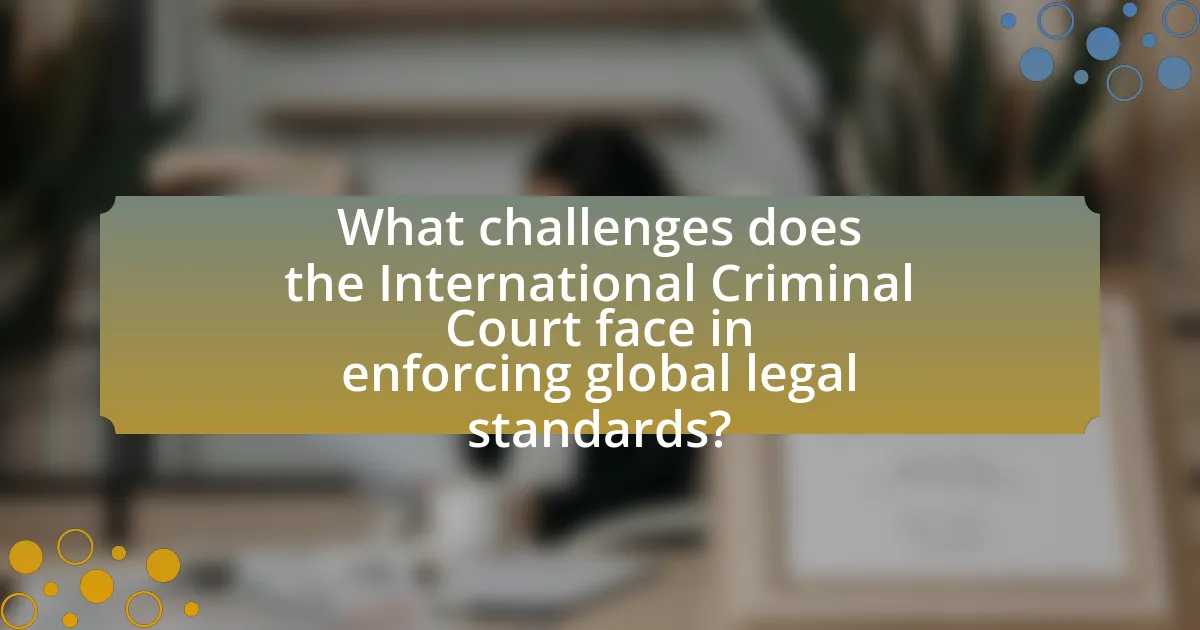
What challenges does the International Criminal Court face in enforcing global legal standards?
The International Criminal Court (ICC) faces significant challenges in enforcing global legal standards, primarily due to issues of state cooperation, political influence, and limited jurisdiction. State cooperation is crucial for the ICC to execute arrest warrants and gather evidence; however, many countries are reluctant to comply, often citing national sovereignty or political considerations. For instance, countries like Sudan and Libya have failed to arrest indicted individuals, undermining the court’s authority. Additionally, political influence can hinder the ICC’s operations, as powerful nations may resist accountability for their actions or those of their allies, leading to selective enforcement of international law. Furthermore, the ICC’s jurisdiction is limited to crimes committed in states that are party to the Rome Statute or those referred by the United Nations Security Council, which can restrict its ability to address violations in non-member states. These challenges collectively impede the ICC’s effectiveness in upholding global legal standards.
What are the limitations of the International Criminal Court’s jurisdiction?
The International Criminal Court (ICC) has several limitations on its jurisdiction, primarily defined by the principle of complementarity, which means it can only prosecute cases when national courts are unwilling or unable to do so. Additionally, the ICC’s jurisdiction is limited to crimes committed after its establishment in 2002, and it can only prosecute individuals from states that are party to the Rome Statute or those that have accepted its jurisdiction. Furthermore, the ICC cannot investigate or prosecute crimes that occurred in non-member states unless referred by the United Nations Security Council, which has the authority to refer situations to the ICC under Chapter VII of the UN Charter. These limitations restrict the ICC’s ability to act universally and effectively in all situations of international crimes.
How does state sovereignty impact the International Criminal Court’s effectiveness?
State sovereignty significantly impacts the International Criminal Court’s (ICC) effectiveness by limiting its jurisdiction and enforcement capabilities. The ICC relies on member states to cooperate in arresting and extraditing individuals accused of crimes, but many states prioritize their sovereignty over international obligations, leading to non-compliance. For instance, countries like Sudan and Kenya have refused to arrest indicted leaders, undermining the ICC’s authority and ability to prosecute. This tension between national sovereignty and international law creates barriers to accountability for serious crimes, ultimately diminishing the ICC’s role in enforcing global legal standards.
What challenges arise from non-cooperation by member states?
Non-cooperation by member states presents significant challenges to the effectiveness of the International Criminal Court (ICC) in enforcing global legal standards. These challenges include the inability to arrest indicted individuals, which undermines the court’s authority and credibility; delays in legal proceedings due to lack of support from states; and the erosion of international norms, as non-compliance can embolden other states to disregard their obligations. For instance, the ICC has faced difficulties in executing arrest warrants, such as those for Sudan’s former president Omar al-Bashir, who was not apprehended despite being indicted for war crimes. This lack of cooperation directly impacts the ICC’s capacity to deliver justice and uphold accountability on an international scale.
How does public perception affect the International Criminal Court’s role?
Public perception significantly influences the International Criminal Court’s (ICC) role by shaping its legitimacy and effectiveness. When the public views the ICC as a credible institution, it enhances the court’s ability to prosecute war crimes and crimes against humanity, as seen in cases like the conviction of Thomas Lubanga in 2012, which was supported by widespread media coverage and public interest. Conversely, negative public perception, often fueled by accusations of bias or ineffectiveness, can undermine the ICC’s authority and hinder cooperation from states, as evidenced by the withdrawal of several African nations from the court in response to perceived targeting of African leaders. Thus, public perception directly impacts the ICC’s operational capacity and its overall mission to uphold global legal standards.
What are common criticisms of the International Criminal Court?
Common criticisms of the International Criminal Court (ICC) include allegations of bias, inefficiency, and limited jurisdiction. Critics argue that the ICC disproportionately targets African nations, with 70% of its cases coming from the continent, raising concerns about fairness and impartiality. Additionally, the court has faced accusations of being slow and bureaucratic, with lengthy trial processes that can take years to conclude. Furthermore, the ICC’s jurisdiction is limited to crimes committed in member states or by their nationals, which some argue undermines its ability to address global injustices effectively. These criticisms highlight significant challenges the ICC faces in fulfilling its mandate to enforce global legal standards.
How can the International Criminal Court improve its public image?
The International Criminal Court can improve its public image by enhancing transparency and communication with the global community. By regularly publishing detailed reports on its activities, decisions, and the rationale behind them, the Court can foster greater understanding and trust among member states and the public. For instance, the ICC’s outreach programs, which aim to educate communities about its role and functions, have shown positive impacts in regions affected by conflict, thereby reinforcing its legitimacy and relevance. Additionally, addressing criticisms regarding perceived bias or inefficiency through open dialogues and reforms can further bolster its credibility and public perception.
What best practices can enhance the effectiveness of the International Criminal Court?
Enhancing the effectiveness of the International Criminal Court (ICC) can be achieved through several best practices. Strengthening cooperation with member states is crucial, as it ensures timely arrest and extradition of suspects, which is vital for the court’s operations. For instance, the ICC’s ability to prosecute individuals relies heavily on the willingness of states to comply with its requests, as seen in cases like the arrest warrants issued for Sudan’s Omar al-Bashir, which faced challenges due to lack of cooperation from certain countries.
Improving outreach and communication with affected communities can also enhance the ICC’s legitimacy and effectiveness. By engaging with victims and local populations, the ICC can better understand the context of crimes and ensure that its proceedings are perceived as relevant and just. This approach was highlighted in the ICC’s outreach efforts during the trial of Jean-Pierre Bemba, where community engagement helped to foster a sense of ownership over the judicial process.
Lastly, increasing resources and funding for investigations and prosecutions is essential. Adequate funding allows the ICC to conduct thorough investigations and maintain a skilled workforce, which is critical for building strong cases. The court has faced budgetary constraints that have hindered its ability to pursue cases effectively, underscoring the need for sustained financial support from member states.
How can the International Criminal Court strengthen its partnerships with states?
The International Criminal Court can strengthen its partnerships with states by enhancing diplomatic engagement and fostering collaborative initiatives. By actively participating in multilateral forums and establishing regular communication channels, the Court can build trust and encourage states to cooperate in investigations and prosecutions. For instance, the ICC’s outreach programs have successfully increased awareness and support among member states, leading to improved collaboration on legal matters. Additionally, the Court can offer technical assistance and capacity-building programs to help states develop their judicial systems, thereby promoting adherence to international legal standards and facilitating mutual support in addressing crimes under its jurisdiction.
What strategies can the International Criminal Court implement to increase awareness and support?
The International Criminal Court (ICC) can implement targeted outreach programs and educational initiatives to increase awareness and support. By collaborating with local communities, educational institutions, and civil society organizations, the ICC can disseminate information about its mandate, functions, and the importance of international justice. For instance, the ICC has previously engaged in outreach activities in various countries, which have proven effective in fostering understanding and support for its work. Additionally, leveraging social media platforms and digital campaigns can enhance visibility and engagement, reaching a broader audience. Research indicates that increased public awareness correlates with greater support for international legal institutions, as seen in surveys conducted by the Global Governance Institute, which highlight the positive impact of awareness campaigns on public perception of the ICC.
